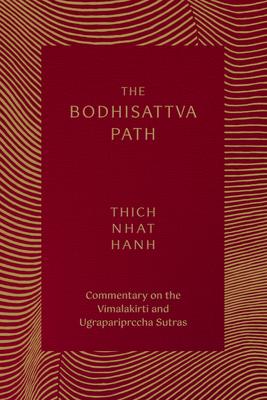The Bodhisattva Path: Commentary on the Vimalakirti and Ugrapariprccha Sutras

The Bodhisattva Path: Commentary on the Vimalakirti and Ugrapariprccha Sutras
Learn about the bodhisattva ideal--the capacity to see the potential for awakening in everyone and aspire to help them along their path--with new commentaries on early Mahayana sutras from Zen Master Thich Nhat Hanh, the monk Time magazine calls "the father of mindfulness." Based on a three-month retreat given by Ven. Thich Nhat Hanh in the winter of 1991, this book gives an historical account of the emergence of the bodhisattva ideal during the first century CE, together with Thich Nhat Hanh's previously unpublished commentaries on two early Mahayana sutras--the Ugraparipṛccha Sutra (The Questions of the Householder Ugra) and the Vimalakīrti-nirdeśa Sutra (The Instructions of Vimalakīrti). About 150 years after the death of the historical Buddha, Buddhism had begun to develop into many separate schools, in which many monks came to prioritize their own personal liberation in their teaching and practice, while making Buddhism into a series of doctrines that served their own school. They came to live in a way that was cut off from other schools and from laypeople and saw laypeople as there primarily to make offerings and support the monks, not as practitioners who could also benefit fully from the Buddha's teachings. Consequently, around the first century CE, there arose among lay and monastic practitioners the desire to popularize Buddhism and bring it out of the ivory tower and back in touch with life in the world, as it had been in the time of the Buddha. From this movement sprang the Mahayana path, which aimed to provide the deepest wellsprings of Buddhist thought to all people, regardless of their social background. Central to the Mahayana teachings is the idea of bodhicitta (the mind of love), which was personified in the bodhisattva, who sees the potential for enlightenment in everyone and vows to help them on their path to awakening. Soon Mahayana sutras began to appear, encouraging practitioners to develop the qualities of a bodhisattva in themselves. The Ugraparipṛccha Sutra counsels students on the bodhisattva path, giving practical instructions on how to help others suffer less. The Vimalakīrti-nirdeśa Sutra focuses on bringing the deepest teachings of Buddhism to ordinary people, with teachings on the ultimate dimension and Buddhist ethics. With his insightful commentary on these two important sutras, Ven. Thich Nhat Hanh continues the inclusive spirit of the early Mahayana practitioners.
PRP: 136.09 Lei
Acesta este Prețul Recomandat de Producător. Prețul de vânzare al produsului este afișat mai jos.
122.48Lei
122.48Lei
136.09 LeiLivrare in 2-4 saptamani
Descrierea produsului
Learn about the bodhisattva ideal--the capacity to see the potential for awakening in everyone and aspire to help them along their path--with new commentaries on early Mahayana sutras from Zen Master Thich Nhat Hanh, the monk Time magazine calls "the father of mindfulness." Based on a three-month retreat given by Ven. Thich Nhat Hanh in the winter of 1991, this book gives an historical account of the emergence of the bodhisattva ideal during the first century CE, together with Thich Nhat Hanh's previously unpublished commentaries on two early Mahayana sutras--the Ugraparipṛccha Sutra (The Questions of the Householder Ugra) and the Vimalakīrti-nirdeśa Sutra (The Instructions of Vimalakīrti). About 150 years after the death of the historical Buddha, Buddhism had begun to develop into many separate schools, in which many monks came to prioritize their own personal liberation in their teaching and practice, while making Buddhism into a series of doctrines that served their own school. They came to live in a way that was cut off from other schools and from laypeople and saw laypeople as there primarily to make offerings and support the monks, not as practitioners who could also benefit fully from the Buddha's teachings. Consequently, around the first century CE, there arose among lay and monastic practitioners the desire to popularize Buddhism and bring it out of the ivory tower and back in touch with life in the world, as it had been in the time of the Buddha. From this movement sprang the Mahayana path, which aimed to provide the deepest wellsprings of Buddhist thought to all people, regardless of their social background. Central to the Mahayana teachings is the idea of bodhicitta (the mind of love), which was personified in the bodhisattva, who sees the potential for enlightenment in everyone and vows to help them on their path to awakening. Soon Mahayana sutras began to appear, encouraging practitioners to develop the qualities of a bodhisattva in themselves. The Ugraparipṛccha Sutra counsels students on the bodhisattva path, giving practical instructions on how to help others suffer less. The Vimalakīrti-nirdeśa Sutra focuses on bringing the deepest teachings of Buddhism to ordinary people, with teachings on the ultimate dimension and Buddhist ethics. With his insightful commentary on these two important sutras, Ven. Thich Nhat Hanh continues the inclusive spirit of the early Mahayana practitioners.
Detaliile produsului










